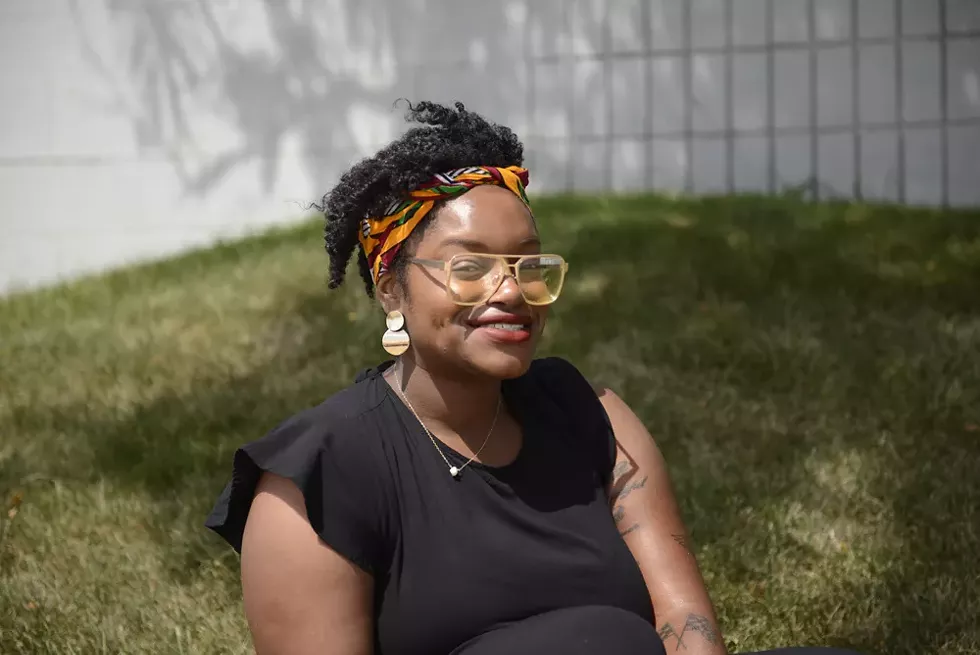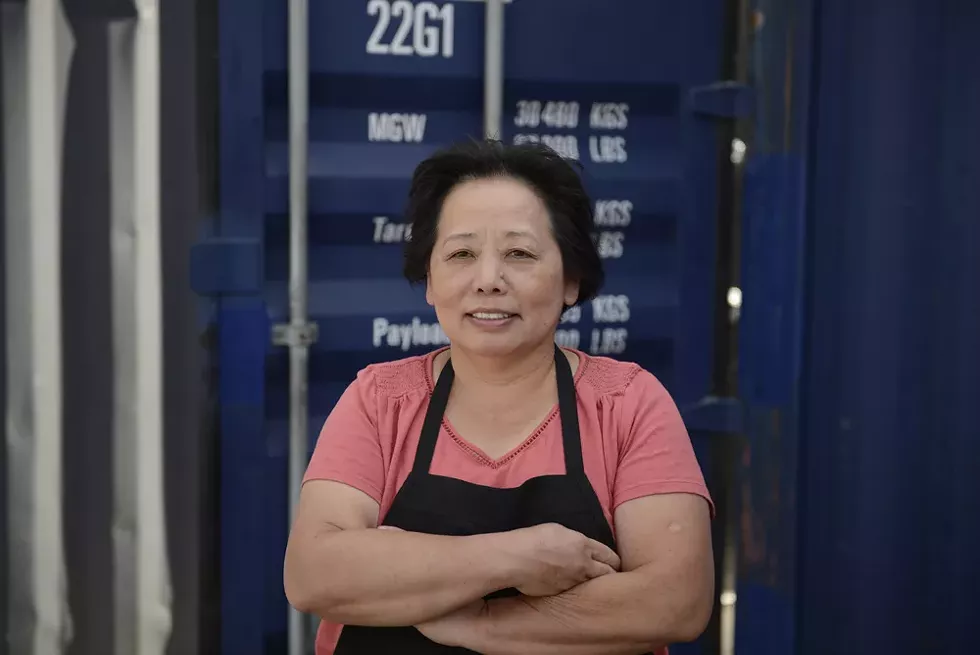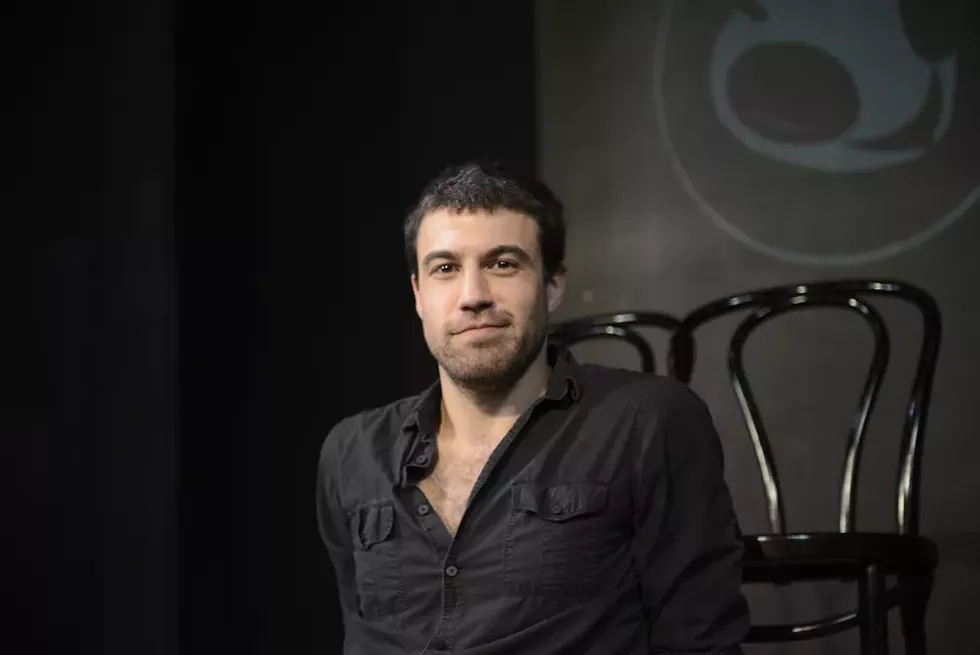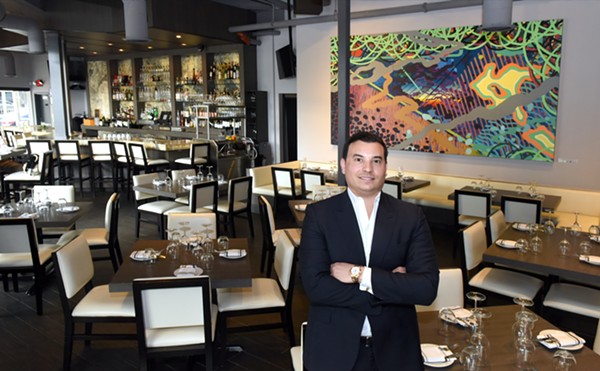The Wayne State University class of 2019 had a special graduate at its ceremony. During all the pomp and circumstance, Jack White — the Detroit musician and entrepreneur — got to move his mortarboard tassel to the left when he received an honorary doctor of humane letters for "his dedication to Detroit and significant contributions to the arts as one of the most prolific and renowned artists of the past two decades." White dropped out of Wayne State, his now honorary alma mater, after a single semester to, you know, become a fucking game-changing rockstar with a penchant for charitable donations (see the Masonic Temple, and, more recently, Hamtramck's historic Negro League ballpark) who has also been credited for helping revive the vinyl record industry.
Also in May of this year, the New York Times ran an op-ed citing that one in three American college students enrolled in higher education will never earn a degree. Instead, they'll drop out. Also reported, though not in that particular op-ed, is that Americans owe an estimated $1.56 trillion in student debt. (See our other feature story in this week's issue.) While not all college dropouts will go on to receive honorary degrees, many do find their own way — some by choice, others by circumstance, and some who thought they had it all figured out until they didn't.
Detroit's Ashley Addrow-Pierson was excited about college. And so was her pro-academia family.
Now an owner of fashion eyewear brand and a chef at the Aretha Franklin Amphitheatre, Addrow-Pierson attended Hampton University in Virginia before applying to Wayne State University with a focus on marketing and economics.
"I had a boyfriend at the time, so I was like, OK, I'm going to apply to Wayne State real quick, I'll get in, and we'll be good," she says. "I applied, got in and was like, 'yas, Wayne State.'"
Meanwhile, she was working part-time for what she described as being a "small boutique marketing firm" — long before Detroit's "resurgence."
"I was working directly under Tony Saunders [now, the COO of Rock Ventures] and I had signed my first client, Vicente's, downtown," she says. "I was like, wait a minute, I'm helping signing clients, I'm basically doing what I'm going to be doing in college right now. So at that point, I was like, is it really worth it for me to get in debt? Because I didn't really have debt, my parents paid for Hampton and I had [$2,000 to $3,000] in scholarship for Wayne, I was like, do I really need to do this?"
She enrolled in Oakland Community College to keep the academic train chugging, but found herself disenchanted with the life she thought she wanted. Instead, she began to immerse herself in the arts scene, sneaking into the since shuttered Lola's to attend open mics and other art events.
‘I was like, wait a minute, I’m helping signing clients, I’m basically doing what I’m going to be doing in college right now. So at that point, I was like, is it really worth it for me to get in debt?’
tweet this
"I wasn't broke-broke, but at the same time I'm not in college and my parents are no longer paying for everything," she says. "So, I began thrifting and finding all of these cool glasses. I had met a local poet and rapper, Mic Phelps, and we became a couple. So I started going to his shows, [and] everyone stopped me: where'd you get those glasses? I'm like, oh, they're vintage, I don't know. It kept happening over and over to the point where people were asking me to shop for them. I was never the fashion person."
But her sister was, while her other sister was more business-minded. Addrow-Pierson found herself somewhere in the middle, researching glasses and retro frames and began selling them at local art shows.
"Places you wouldn't necessarily expect people to be selling, I was there every single night," she says. "It paid my bills."
In her opinion, the vintage market took a sharp and expensive turn when Macklemore and Ryan Lewis' song "Thrift Shop" hit the airwaves and its companion video went viral. After a while, prices started going up and Addrow-Pierson was forced to assess the profitability of her plan. With more research and the discovery of a long-lost cousin who was also into the optical business, she began offering retro-inspired sunglasses and frames online and in local shops like Third Wave Music and Detroit Clothing Circle. Soon, she hopes to be able to include prescription lenses in her high fashion frames as part of a growing partnership with Freye's New Look Optical in Highland Park.
"I want people who wear opticals to be a fashionista every day and have 10 pairs of glasses and wear them when and how they want," she says. "Money shouldn't be the thing that holds you back."
Addrow-Pierson has some pretty grand plans that involve expanding the brand, as well as becoming a yoga teacher (she's currently in training). She says she would like to retire at 45, meaning the 30-year-old has some hustling to do, and she's fine with it.
"We've been trained to not pursue what we're passionate about," she says. "My parents are super about college, they love college. My grandfather was vice president of student affairs at Oakland University. I just saw life differently and I didn't think my particular path required schooling."
She adds that with her college jumping, she's amassed enough credits to be able to enroll in college as a junior should she choose to return.
"I could go to law school if I wanted, but I don't have to do these things right here right now," she says. "I'm allowing myself to experience and explore."
For Detroit chef Genevieve Vang, pursuing higher education was important but was not the key to a fresh start for her and her family.
Vang, 53, is the chef behind the venerable Thai restaurant Bangkok 96 in Dearborn and, as of last year, the creative mind behind her family restaurant's more adventurous offshoot (see her Pad Thai Roll or Thai Pizza) Bangkok 96 Street Food, located in the Detroit Shipping Company food hall.
Over the course of her career, she has been recognized as 2018's chef of the year by Eater Detroit, found herself listed as a semi-finalist for a 2019 James Beard Award among eight culinary visionaries representing the Great Lakes region, and has done everything from competing on Food Network's Clash of the Grandmas to heeding the call of Clint Eastwood to cater traditional Hmong food to be included in his 2008 Detroit-made film Gran Torino. Vang describes herself as a problem solver and a perpetual learner, which led her to embark on frozen food retail, which she did for several years and later, formed Thai Feast — a company that produces vegan, gluten- and soy-free single-serving soup spice packets that serve as a low sugar, low sodium, gluten-and-soy free broth base. She's even investigated what it would take to create rice without carbs. Vang has, if anything, overcome insurmountable odds to make her mark.
"When you're born to be an Asian woman, as an entrepreneur, or housewife or student, even a little girl, you have to cook," she says. "My mom always [taught] us that you have to cook, even when you are in school, you have to know how to cook because if you don't cook, you don't have a husband."
Born in Laos during that country's civil war, Vang and her family fled their home country when she was 11 years old. They would spend two years as refugees, relocating from Thailand to France, where her father, a Laotian soldier from the age of 9 years old, moved the family from Paris to a remote French village where he eventually took his own life just two miles from the house. Vang said that she and her family had waited for him to return in hopes that he would take the family to the city or to the United States. However, Vang said they only learned of her father's death six years after he left, when authorities discovered his body.
‘When you’re born to be an Asian woman, as an entrepreneur, or housewife or student, even a little girl, you have to cook.’
tweet this
"There was no happiness, there was no hope," Vang says of her early years in France, which she describes as being isolating and lonely. "If you are a refugee, it's so strange. You don't know what you're going to face. It was a beautiful country, but it's worse than where we came from because of lack of communication, lack of people. Just one house in a forest."
Soon after her father's death, her mother fell ill and was subjected to surgeries, medications, and side effects that created a world of worry for Vang, making it difficult for her to concentrate on her studies. "Of course, I go to school every day, but it doesn't stay inside my head because you worry about something and you understand, but it doesn't stay in your mind because that worry is so big because you know nobody can help your family," she says. "I went to school every day until college, but I never [finished]."
She enrolled in classes relating to fashion and manufacturing and took the initiative to study French cuisine but discontinued her education to get married and start a family with Guy — her husband and the current head of operations at Bangkok 96 in Dearborn. Vang says she married young (both she and Guy were teenagers), in hopes that she could relocate her family from France to the United States and, though she wanted that for herself, only a man could provide those opportunities.
"I'm just lucky he's a very nice person and I've been able to do what I have to do," she says of Guy. "He never controls money. He never controls me. He is a lovely husband."
Vang's dreams of entrepreneurship came true in 1996 when she and Guy opened Bangkok 96 in Dearborn on Telegraph Road, seven years after they arrived in the U.S. to reunite with his family to start a new life. In 2002, however, the restaurant owner's dream was nearly thwarted as Vang, her husband, and daughter Caroline had found themselves in the middle of a complicated citizenship battle when the Immigration and Naturalization Service lost paperwork — putting their case on hold, and threatening the family with deportation. Following a 2002 Metro Times cover story about the family's battle, a flood of support poured in from the community, as well as U.S. Sens. Carl Levin and Debbie Stabenow, who helped push the case forward. Vang says she and her husband only received their green cards six months before the election of President Donald Trump.
"I'm so happy and grateful and humbled to be here," she says, referring to Bangkok 96's Detroit location as her second home, adding that she spends close to 60 hours a week tending to the 150-square-foot stall. Vang says her husband worries about her clocking in such long hours and both wish that they could spend more time together. But as she says, "this is life."
"Every day you meet different people, new people, you do something new," she says. "Every day I wake up, I always think make sure today is a good day for me, I don't want to hear negative things. I just think, I want to have a good day today."
Five miles away from Vang's Thai food laboratory, Planet Ant's executive director, Darren Shelton, is figuring shit out. His formula, which can be applied to engineering, balancing the books of a beloved nonprofit community theater, and his 0wn sobriety, comes down to three questions: Do the numbers make sense, will this work out on a practical level, and is he willing to do the work to get it done?
"It's cool to have a role where my job is literally listening to a bunch of artists and try and find a way to do the crazy shit they want to do," he says. "And, you know, it's not rare to be like, we need $13,000 more to not close this month, and the month ends in seven days. Then it's like, well, fuck it, let's figure it out. I mean, we've done it every month for years and years and years. Not to take for granted that it takes a lot of work and it takes a lot more than just me and my mind. I trust this community and this community trusts us when we need them to show up. It's not like a consolation. I think we put up good stuff here."
Hamtramck's Planet Ant started out as a coffee shop in 1993 before transitioning into a small black-box theater three years later, and, as of 2019 is a sprawling campus of multi-use venues for performers across all disciplines with a strong focus on improv comedy and is where Michigan-born comedians Keegan-Michael Key, Sam Richardson, Tim Robinson, and Maribeth Monroe honed their skills.
Shelton, 29, estimates that he spends somewhere between 12-15 hours a day, seven days a week at Planet Ant, overseeing the operations for the theater's Ant Hall, Ghost Light venue, and the Independent Comedy Club situated in a cozy corner in the back of the theater.
So, how did a rising engineering student wind up behind the wheel of a community nonprofit?
"Well, it's like a unique combination of like an aptitude toward math and having been a heroin addict," he says. "So it's like the most strange situation ever."
Shelton entered Wayne State in 2008, where he quickly became the student council representative for the college of engineering. During his first two years, he became active in the Detroit party scene and then the after-hours scene, which led him to harder substances, and, eventually, a daily heroin habit.
"I still tried to keep up education in general," he says. "I still tried to go to classes, but you know, you're not really a great participant in a philosophy lecture when you're sneaking out to shoot up dope in the middle of class."
"Half of school is just dealing with the system of school. You can do really well in school and learn nothing," he says. "The most impactful things are things that you experience, and like, yes, I think college can be a vehicle for those experiences. But it's not like they exist only exclusively in college."
After dropping out of Wayne, he transferred to U-M Dearborn before calling it quits on school altogether to survive what he refers to as "a handful of drug-riddled years." He's lost count of the short term rehabs he attempted early on in his recovery, but estimates attending various treatment programs six or seven times before committing to his final rehab stint, a three-month detox program out of Ann Arbor and, once completed, took up residence in a three-quarter house. Today, Shelton has been sober for seven years "and some change."
Following rehab, he partnered with a friend to start a residential remodeling and construction company. Shelton says this was a natural progression, considering he had grown up working on rental houses with his parents. (He notes, too, that his grandfather was a foreman who built Farmer Jack grocery stores and that his parents met at a Farmer Jack where they both worked.) From here, Shelton became a bit of a human Katamari — picking up various jobs, skills, positions, and properties. He used the money from a fraternity house remodel to buy an abandoned house in River Rouge, where he lived and eventually flipped and, with the money from an 80-hour a week concrete factory job, bought the abandoned house next door and lived off of meager rental property earnings. How he ended up doing physical labor at Planet Ant isn't entirely random.
"I've had a connection to Planet Ant my whole life because my parents were the other half of the partnership who started Planet Ant as a coffee shop in the '90s," he says, adding that though his parents stepped away when it switched over to a theater, he and his family found themselves regularly attending plays and improv performances.
‘Half of school is just dealing with the system of school. You can do really well in school and learn nothing.’
tweet this
"At some point in that ridiculous scheme of moving around and fixing up buildings and hustling, I started doing work at the original black-box theater," he says. "I did a lot of building projects and kitchen renovations and slowly that switched over to helping with sets. I credit the artists at this place. I mean, there's an unbelievable roster of some of the most brilliant creative minds and just being around them, even when I was just working on the kitchen or doing drywall, it was hard to not get thrust into the creative side, which is how I slowly got more and more involved with the operations of Planet Ant."
It wasn't until 2017 that Planet Ant's founder and former executive director retired and Shelton was voted by the board of directors to fill the executive director role, where he exercises his engineering brain and his natural attention to numbers and patterns.
"Most people are like, oh, how do I make this financially viable? I fucking hate that question so much," he says. "How do we make it financially viable? You figure out how much it costs, you figure out how much you'll make, and then you figure out where the difference comes from."
"There are so many plays, there are so many concerts, there are so many things that don't happen because they won't make enough money or they won't bring enough people through the door," he says. "What's the fucking point? What's the point if at the end of the day, the only mark of success is a bottom line that shows a profit? I hate money."
In addition to a disdain for money, Shelton admits to not wanting nor needing for much, and is rarely scared of failure.
"I've been a homeless heroin addict in my life," he says. "So, there's not very many situations that scare me." This includes setting Nicolas Cage's stuntman on fire in an attempt to break a world record as part of Planet Ant's annual UnCaged Festival, an annual themed film festival celebrating Cage's colorful career and personal life. This required countless city meetings, securing permits, ironing out logistics, and Shelton's superpower — fundraising. "There was no doubt in my mind that we would do it," he says.
"I don't want to sound like I'm a martyr because I fucking love being here," he says. "I mean, it's hard work, but it's the right kind of hard work. I can do stuff here and literally watch people's lives get better. I can watch people who may feel like an outcast or who may feel like they don't have a creative outlet. Like every day of my life, I get to see those people show up, open up, be vulnerable to a group, and the next thing you know, they're making ridiculously awesome art."
Stay on top of Detroit news and views. Sign up for our weekly issue newsletter delivered each Wednesday.









